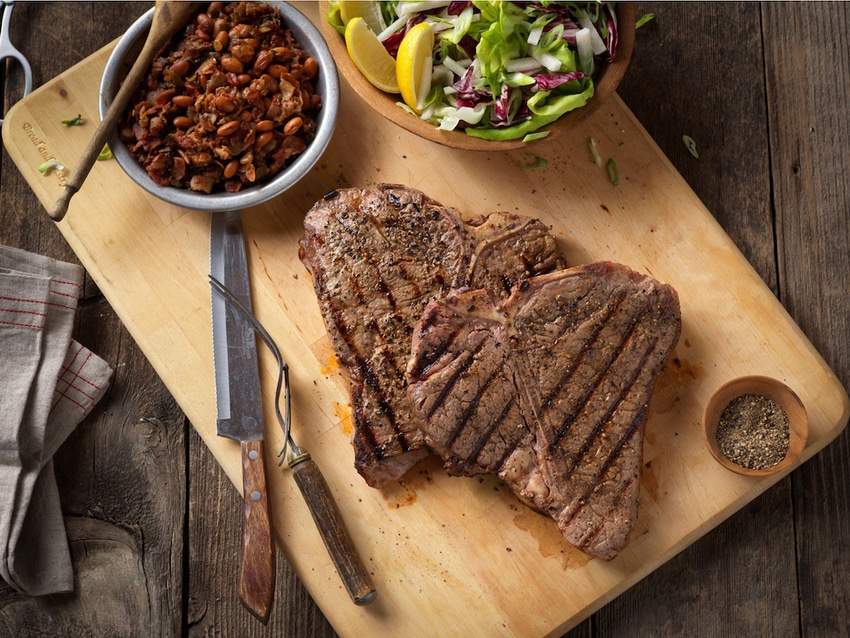As the 2020 Dietary Guidelines for Americans is shaped, will sustainability, animal welfare or other factors play into the nutritional recommendations?
July 22, 2020

The battle for the center of our dinner plates continues.
The 2020 Dietary Guidelines Advisory Committee Report was released earlier this week, but don’t mistake it for the final recommendations. Those are still in the works, and that’s where your help is urgently needed to ensure that the committee gets it right.
So what does the report mean?
The newly released committee report provides an overview of the latest available science on a variety of nutrition topics to be weighed by the nutrition science experts on the committee. This committee then provides guidances for the USDA and the U.S. Department of Health and Human Services (HHS) to review as they develop the final Dietary Guidelines for Americans.
Remember, these guidelines shape our nation’s menus at daycares, schools, hospitals, nursing homes, the military and more. These guidelines are what is taught to our healthcare professionals at medical school.
While perhaps the guidelines were created with good intentions in mind, the sad reality is that a generation later, 60% of American adults now live with at least one chronic condition, and 40% of American adults are obese, with a body mass index of 30 or higher.
This certainly doesn’t make the case for the efficacy of the Dietary Guidelines for Americans. And now, these dietary guidelines are being perverted to consider other things outside the scope of optimal nutrition.
Many believe we should weigh other factors such as climate change and animal welfare into the recommendations. This is a ridiculous notion, of course, when the guidelines cannot even consider that a one-size-fits-all dietary approach doesn’t meet the needs of the chronically ill and obese individuals in this country.
What’s more irritating is that previous guidelines have been a reflection of the flawed idea that plant-based diets are king and animal fats and proteins should be avoided.
We need every rancher, every parent, every grandparent, every citizen who enjoys meat, dairy and eggs and thrives off the essential nutrients provided by animal products to get engaged in this fight.
Not inspired to take action? Well, get a load of a few sample headlines to see how proponents of plant-based diets are lobbying the committee to shape these guidelines in their favor.
Joseph Winters for Grist writes, “At the center of most of these failures were the food sector’s two biggest emitters: meat and dairy. Springmann said national governments have tended to shy away from specific recommendations about whether or how much of these products to eat, despite clear links to health and environmental issues. For example, red meat has been uncontroversially implicated in cardiovascular disease and cancer, and animal products are responsible for up to 78% of all food-related emissions.”
Maria Chiorando for Plant Based News says the committee “missed the mark when they failed to warn against dairy products, which are the leading source of saturated fat in the American diet.”
And Liam Pritchett for Live Kindly calls the government’s failure of healthy dietary guidelines “shocking.”
Although I don’t agree with the arguments on why the guidelines are flawed, I agree 100% that this committee is getting it wrong. And if these guidelines are going to continue to be influenced by political leanings and lobbying efforts from both sides of the aisle, why are we letting a committee dictate a one-size-fits-all approach for the American people?
Perhaps we need less control, not more, about what goes on the center of our plates. Maybe, just maybe, the idea of dietary recommendations from Uncle Sam is a little outdated.
If you can sense my frustration, it’s because as a mom, I want my kids to have access to the best nutrition possible. And I want guidelines that reflect true science, not recommendations that sway in the wind based on who is in the White House.
Mostly, I want to maintain my freedom to choose healthy foods my family loves and that we can afford, based on my own preferences and not the ideologies of strangers and popular culture. And yet, there is an active campaign to strip me of those choices, and that’s why we must take a stand.
If you, too, share my frustrations, now is the time to comment and make your voice heard loud and clear.
On July 22, the National Cattlemen’s Beef Association (NCBA) launched a nationwide grassroots campaign to highlight the #BenefitsofBeef and is calling on cattle producers to submit public comments in support of federal dietary guidelines that recognize beef’s role in healthy diet.
According to an NCBA press release, “Americans now have until Aug. 13 to submit official comments as the USDA and the HHS work to finalize the 2020-2025 Dietary Guidelines for Americans (DGAs).
“NCBA has engaged for the past two years to ensure the Dietary Guidelines are focused on nutrition and based on sound science. NCBA applauded the DGAC’s recommendations released last week, but anti-meat advocates are already working to downplay the important role meat plays in these guidelines.”
NCBA is currently working to generate public comments and earned media attention, and I urge you to utilize their platform to submit your comments and inform the committee that you support beef as a health food!
Click here to submit your letter. It just takes a moment as there are prompts ready to roll for you if you wish to use them.
Thanks for your help in this fight!
The opinions of Amanda Radke are not necessarily those of beefmagazine.com or Farm Progress.
About the Author(s)
You May Also Like





